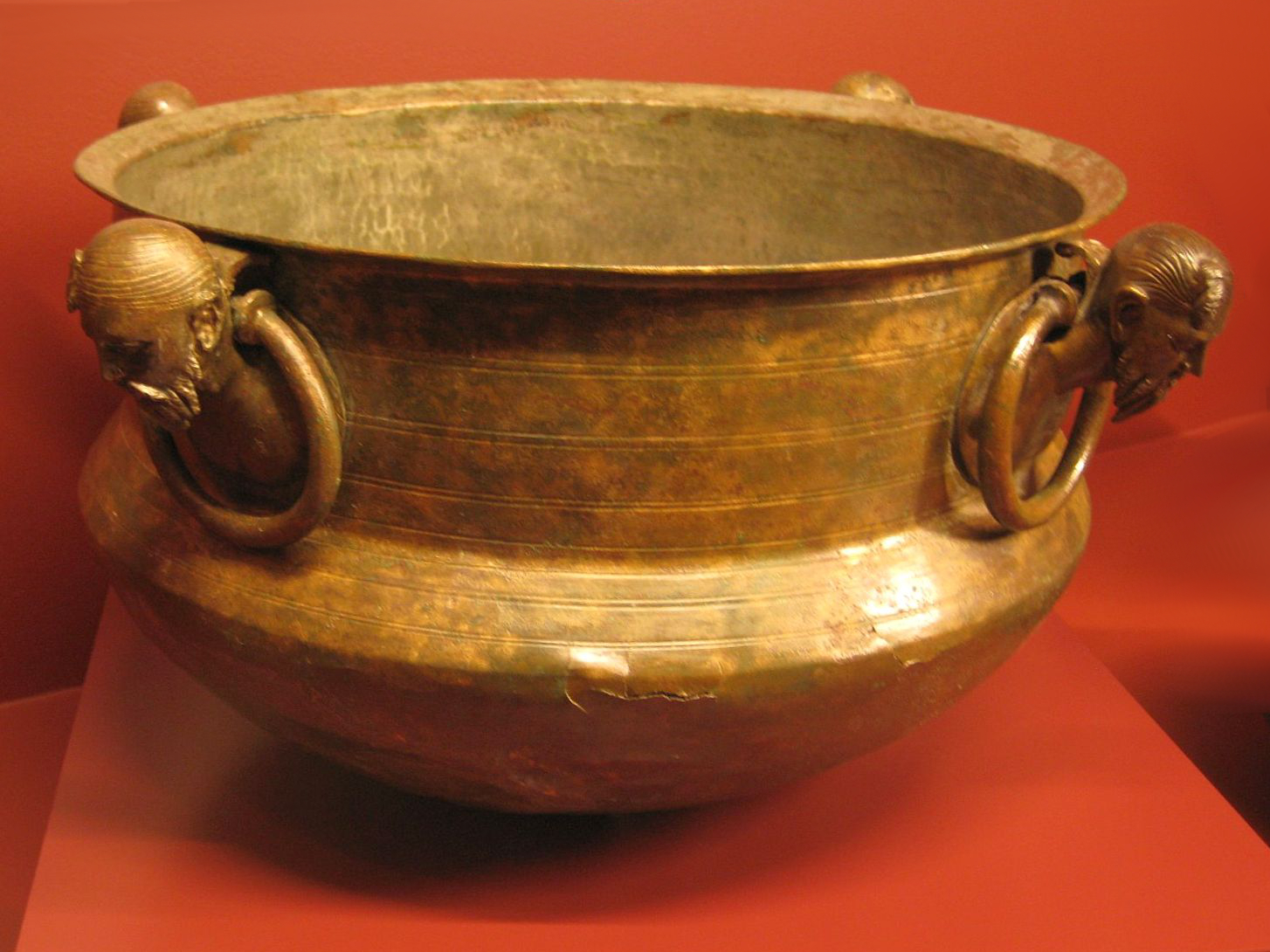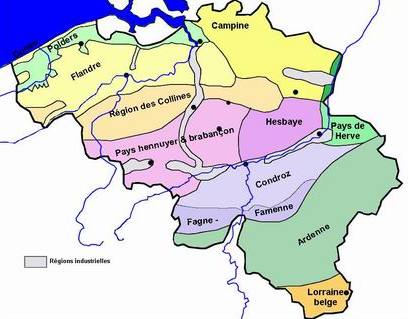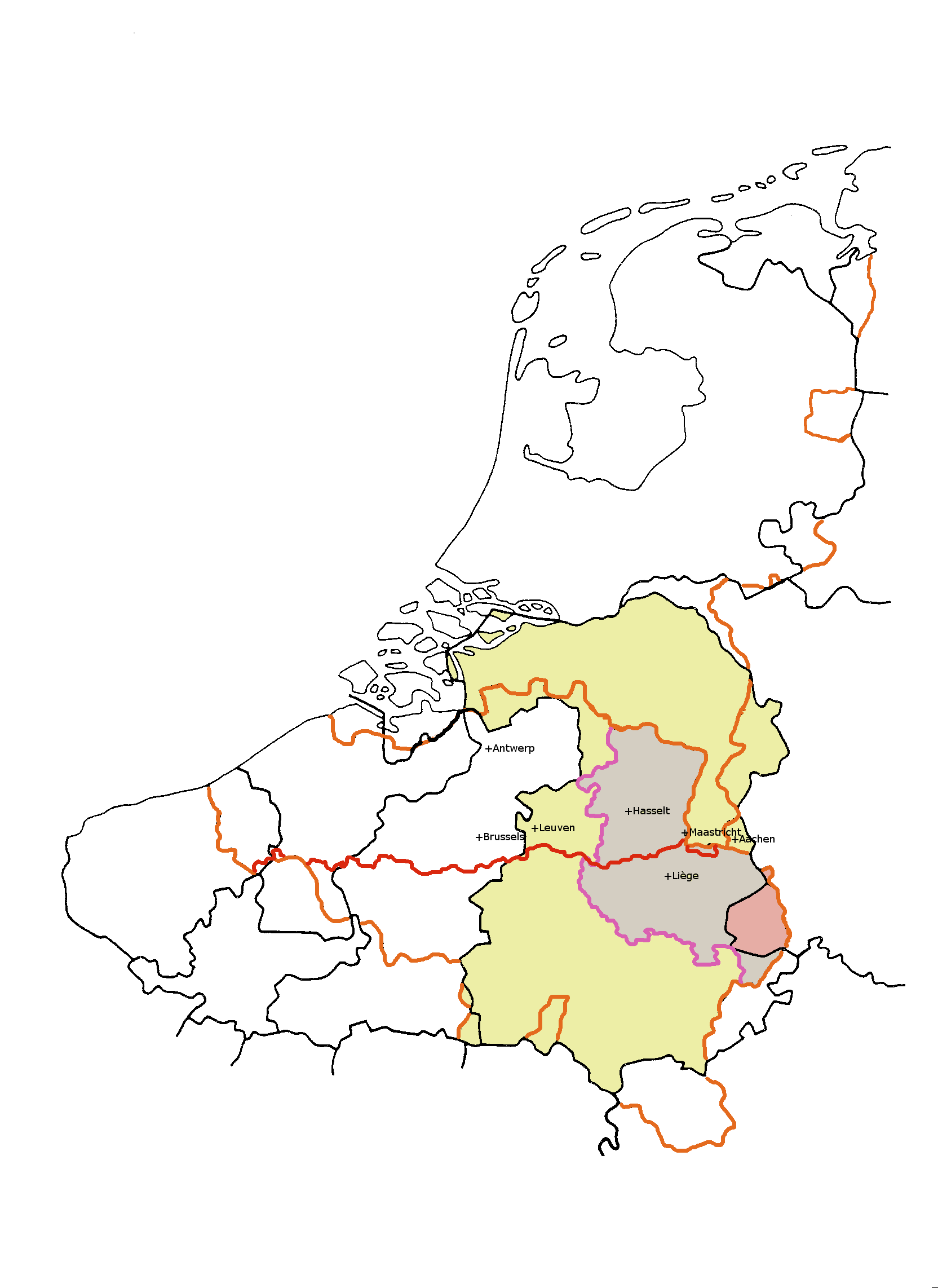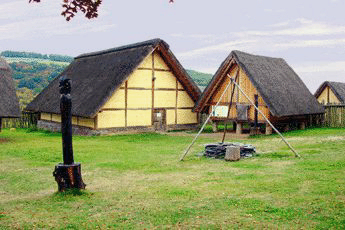|
Tencteri
The Tencteri or Tenchteri or Tenctheri (in Plutarch's Greek, Tenteritē and possibly the same as the Tenkeroi mentioned by Claudius Ptolemy if these were not the Tungri) were an ancient tribe, who moved into the area on the right bank (the northern or eastern bank) of the lower Rhine in the 1st century BC. They are known first from the surviving works of ancient authors such as Julius Caesar and Tacitus. In December 2015, archaeologists believed they found remains of the Tencteri in The Netherlands. Name and language While the Tencteri and their neighbours were referred to by the Romans as Germanic rather than Gauls, the recorded tribal and personal names of the region include many which are most reasonably explained as Celtic. The ethnic name ''Tencteri'' could be either interpreted as the Celtic ''*Tenkteroi'', or else as the Germanic ''*Þenhteraz'', in both cases from the Indo-European root *''tenk''- ('to become solid, firm, immobile') extended by the suffix ''-tero-''. Sfe ... [...More Info...] [...Related Items...] OR: [Wikipedia] [Google] [Baidu] |
Suebi
The Suebi (or Suebians, also spelled Suevi, Suavi) were a large group of Germanic peoples originally from the Elbe river region in what is now Germany and the Czech Republic. In the early Roman era they included many peoples with their own names such as the Marcomanni, Quadi, Hermunduri, Semnones, and Lombards. New groupings formed later, such as the Alamanni and Bavarians, and two kingdoms in the Migration Period were simply referred to as Suebian. Although Tacitus specified that the Suebian group was not an old tribal group itself, the Suebian peoples are associated by Pliny the Elder with the Irminones, a grouping of Germanic peoples who claimed ancestral connections. Tacitus mentions Suebian languages, and a geographical "Suevia". The Suevians were first mentioned by Julius Caesar in connection with the invasion of Gaul by the Germanic king Ariovistus during the Gallic Wars. Unlike Tacitus he described them as a single people, distinct from the Marcomanni, within the larg ... [...More Info...] [...Related Items...] OR: [Wikipedia] [Google] [Baidu] |
Ambivariti
The Texandri (also Texuandri; later Toxandri, Toxiandri, Taxandri) were a Germanic people living between the Scheldt and Rhine rivers in the 1st century AD. They are associated with a region mentioned in the late 4th century as Texandria (also Toxiandria; later Toxandria, Taxandria), a name which survived into the 8th–12th centuries. Name Attestations The only inscription that convincingly mentions the name is dated 100–225 AD and gives the form ''Texand(ri)''. It was found on an altar in Brocolitia (Carrowburgh Fort) near Hadrian's Wall. A more uncertain inscription from Romania dated 102/103 AD reads ''Texu'', and they are also mentioned as ''Texuandri'' by Pliny (1st c. AD), which may suggest that the two forms ''Texuandri'' and ''Texandri'' co-existed already in the late-1st and 2nd centuries AD. The variant form ''Toxiandria'' is only attested once in a 9th-century manuscript of Ammianus Marcellinus' ''Res Gestae'' (ca. 390) to designate the region. The form ''Taxan ... [...More Info...] [...Related Items...] OR: [Wikipedia] [Google] [Baidu] |
Chatti
The Chatti (also Chatthi or Catti) were an ancient Germanic tribe whose homeland was near the upper Weser (''Visurgis''). They lived in central and northern Hesse and southern Lower Saxony, along the upper reaches of that river and in the valleys and mountains of the Eder and Fulda regions, a district approximately corresponding to Hesse-Kassel, though probably somewhat more extensive. They settled within the region in the first century BC. According to Tacitus, the Batavians and Cananefates of his time, tribes living within the Roman Empire, were descended from part of the Chatti, who left their homeland after an internal quarrel drove them out, to take up new lands at the mouth of the Rhine. Proto-history The extremely large timescale of Prehistoric Europe left stone tools and weapons dating from the Paleolithic to the Iron Age that were chronologically ordered and dated in the nineteenth and twentieth centuries. Tribes such as the Chatti, Cimbri, and Langobardi have not been ... [...More Info...] [...Related Items...] OR: [Wikipedia] [Google] [Baidu] |
Ubii
350px, The Ubii around AD 30 The Ubii were a Germanic tribe first encountered dwelling on the east bank of the Rhine in the time of Julius Caesar, who formed an alliance with them in 55 BC in order to launch attacks across the river. They were transported in 39 BC by Marcus Vipsanius Agrippa to the west bank, apparently at their own request, as they feared the incursions of their neighbors, the Chatti. A colony for Roman veterans was founded in 50 AD under the patronage of Agrippa's granddaughter, Agrippina the Younger, who had been born at Ara Ubiorum, the capital of the Ubii. The colony derived its title from the names of Agrippina and her husband, the emperor Claudius, and received the name ''Colonia Claudia Ara Augusta Agrippinensium'', which is the origin of the city's modern name, Cologne. Alongside the allotment of land to veterans, the existing town of Ara Ubiorum was elevated to the status of a '' colonia'', which would have conferred many privileges on the inhabitants. ... [...More Info...] [...Related Items...] OR: [Wikipedia] [Google] [Baidu] |
Belgic Tribe
The Belgae () were a large confederation of tribes living in northern Gaul, between the English Channel, the west bank of the Rhine, and the northern bank of the river Seine, from at least the third century BC. They were discussed in depth by Julius Caesar in his account of his wars in Gaul. Some peoples in Britain were also called Belgae, and O'Rahilly equated them with the Fir Bolg in Ireland. The Belgae gave their name to the Roman province of Gallia Belgica and, much later, to the modern country of Belgium; today "Belgae" is also Latin for "Belgians". Etymology The consensus among linguists is that the ethnic name ''Belgae'' comes from the Proto-Celtic root ''*belg-'' or ''*bolg-'' meaning "to swell (particularly with anger/battle fury/etc.)", cognate with the Dutch adjective ''gebelgd'' "very angry" (weak perfect participle of the verb ''belgen'' "to become angry") and ''verbolgen'' "being angry" (strong perfect participle of obsolete ''verbelgen'' "to make angry"), as wel ... [...More Info...] [...Related Items...] OR: [Wikipedia] [Google] [Baidu] |
Germanic Peoples
The Germanic peoples were historical groups of people that once occupied Central Europe and Scandinavia during antiquity and into the early Middle Ages. Since the 19th century, they have traditionally been defined by the use of ancient and early medieval Germanic languages and are thus equated at least approximately with Germanic-speaking peoples, although different academic disciplines have their own definitions of what makes someone or something "Germanic". The Romans named the area belonging to North-Central Europe in which Germanic peoples lived ''Germania'', stretching East to West between the Vistula and Rhine rivers and north to south from Southern Scandinavia to the upper Danube. In discussions of the Roman period, the Germanic peoples are sometimes referred to as ''Germani'' or ancient Germans, although many scholars consider the second term problematic since it suggests identity with present-day Germans. The very concept of "Germanic peoples" has become the subject of ... [...More Info...] [...Related Items...] OR: [Wikipedia] [Google] [Baidu] |
Condrusi
The Condrusi were an ancient Belgic- Germanic tribe dwelling in what is now eastern Belgium during the Gallic Wars (58–50 BC) and the Roman period. Their ethnic identity remains uncertain. Caesar described them as part of the Germani Cisrhenani, but their tribal name is probably of Celtic origin. Like other Germani Cisrhenani tribes, it is possible that their old Germanic endonym came to be abandoned after a tribal reorganization, that they received their names from their Celtic neighbours, or else that they were fully or partially assimilated into Celtic culture at the time of the Roman invasion of the region in 57 BC. Name They are mentioned as ''Condrusos'' and ''Condrusi'' by Caesar (mid-1st c. BC), and as ''Condurses'' by Orosius (early 5th c. AD)., entry 1967. The meaning of the name ''Condrusi'' remains unclear. The prefix is most likely the Gaulish ''con-/com-'' ('with, together, as well'), and although the translation of the element ''-drus-'' is unknown, it is also g ... [...More Info...] [...Related Items...] OR: [Wikipedia] [Google] [Baidu] |
Eburones
The Eburones (Greek: ) were a Gallic- Germanic tribe dwelling in the northeast of Gaul, in what is now the southern Netherlands, eastern Belgium and the German Rhineland, in the period immediately preceding the Roman conquest of the region. Though living in Gaul, they were also described as being both Belgae and Germani (for a discussion of these terms, see below). The Eburones played a major role in Julius Caesar's account of his "Gallic Wars", as the most important tribe within the ''Germani cisrhenani'' group of tribes — ''Germani'' living west of the Rhine amongst the Belgae. Caesar claimed that the name of the Eburones was wiped out after their failed revolt against his forces during the Gallic Wars, and that the tribe was largely annihilated. Whether any significant part of the population lived on in the area as Tungri, the tribal name found here later, is uncertain but considered likely. Name Attestations They are mentioned as ''Eburones'' by Caesar (mid-1st c. ... [...More Info...] [...Related Items...] OR: [Wikipedia] [Google] [Baidu] |
Tungri
The Tungri (or Tongri, or Tungrians) were a tribe, or group of tribes, who lived in the Belgic part of Gaul, during the times of the Roman Empire. Within the Roman Empire, their territory was called the ''Civitas Tungrorum''. They were described by Tacitus as being the same people who were first called "''Germani''" ( Germanic), meaning that all other tribes who were later referred to this way, including those in Germania east of the river Rhine, were named after them. More specifically, Tacitus was thereby equating the Tungri with the "''Germani Cisrhenani''" described generations earlier by Julius Caesar. Their name is the source of several place names in Belgium, Germany and the Netherlands, including Tongeren, Tongerlo Abbey, and Tongelre. image:Germanie-inferieure.jpg, 301x301px, The Roman province of Germania Inferior, showing Atuatuca, modern Tongeren, the capital of the Tungri (Tongres). Places associated with the Tungri are in bright green. It was on the road between Amiens ... [...More Info...] [...Related Items...] OR: [Wikipedia] [Google] [Baidu] |
Sigambri
The Sicambri, also known as the Sugambri or Sicambrians, were a Germanic people who during Roman times lived on the east bank of the river Rhine, in what is now Germany, near the border with the Netherlands. They were first reported by Julius Caesar, who described them as Germanic (''Germani''), though he did not necessarily define this in terms of language. Whether or not the Sicambri spoke a Germanic or Celtic language, or something else, is not certain, because they lived in the so-called Nordwestblock zone where these two language families came into contact and were both influential. By the 3rd century, the region in which they and their neighbours had lived had become part of the territory of the Franks, which was a new name that possibly represented a new alliance of older tribes, possibly including the Sicambri. However, many Sicambri had been moved into the Roman empire by this time. Language The material culture of the Sicambri which was a variant of the La Tène cult ... [...More Info...] [...Related Items...] OR: [Wikipedia] [Google] [Baidu] |
Moselle
The Moselle ( , ; german: Mosel ; lb, Musel ) is a river that rises in the Vosges mountains and flows through north-eastern France and Luxembourg to western Germany. It is a bank (geography), left bank tributary of the Rhine, which it joins at Koblenz. A small part of Belgium is in its drainage basin, basin as it includes the Sauer and the Our River, Our. Its lower course "twists and turns its way between Trier and Koblenz along one of Germany's most beautiful river valleys."''Moselle: Holidays in one of Germany's most beautiful river valleys'' at www.romantic-germany.info. Retrieved 23 Jan 2016. In this section the land to the north is the Eifel which stretches into Belgium; to the south lies the Hunsrück. The river flows through a region that was cultivated by the Ro ... [...More Info...] [...Related Items...] OR: [Wikipedia] [Google] [Baidu] |
Treveri
The Trēverī (Gaulish: *''Trēueroi'') were a Celtic tribe of the Belgae group who inhabited the lower valley of the Moselle from around 150 BCE, if not earlier, until their displacement by the Franks. Their domain lay within the southern fringes of the ''Silva Arduenna'' ( Ardennes Forest), a part of the vast Silva Carbonaria, in what are now Luxembourg, southeastern Belgium and western Germany; its centre was the city of Trier (''Augusta Treverorum''), to which the Treveri give their name. Celtic in language, according to Tacitus they claimed Germanic descent.Tacitus writes, "The Treveri and Nervii are even eager in their claims of a German origin, thinking that the glory of this descent distinguishes them from the uniform level of Gallic effeminacy." ''Germania'' XXVIII. They possibly contained both Gallic and Germanic influences. Although early adopters of Roman material culture, the Treveri had a chequered relationship with Roman power. Their leader Indutiomarus led them ... [...More Info...] [...Related Items...] OR: [Wikipedia] [Google] [Baidu] |









